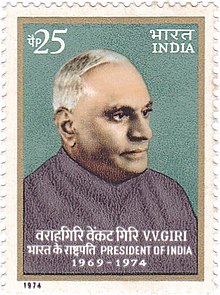V. V. Giri
10 August 1894 – 24 June 1980), commonly known as V. V. Giri, was the fourth president of India from 24 August 1969 to 24 August 1974.
Varahagiri Venkata Giri | |
|---|---|
 V. V. Giri | |
| 4th President of India | |
| In office 24 August 1969 – 24 August 1974 | |
| Vice President | Gopal Swarup Pathak |
| Preceded by | Mohammad Hidayatullah (Acting) |
| Succeeded by | Fakhruddin Ali Ahmed |
| In office 3 May 1969 – 20 July 1969 | |
| Prime Minister | Indira Gandhi |
| Preceded by | Zakir Hussain |
| Succeeded by | Mohammad Hidayatullah (Acting) |
| 3rd Vice President of India | |
| In office 13 May 1967 – 3 May 1969 | |
| President | Zakir Hussain |
| Prime Minister | Indira Gandhi |
| Preceded by | Zakir Hussain |
| Succeeded by | Gopal Swarup Pathak |
| Governor of Mysore State | |
| In office 2 April 1965 – 13 May 1967 | |
| Prime Minister | Indira Gandhi |
| Chief Minister | S. Nijalingappa |
| Preceded by | Satyawant Mallannah Shrinagesh |
| Succeeded by | Gopal Swarup Pathak |
| Governor of Kerala | |
| In office 1 July 1960 – 2 April 1965 | |
| Chief Minister | Pattom Thanu Pillai R. Sankar |
| Preceded by | Burgula Ramakrishna Rao |
| Succeeded by | Ajit Prasad Jain |
| Governor of Uttar Pradesh | |
| In office 10 June 1956 – 30 June 1960 | |
| Chief Minister | Sampurnanand |
| Preceded by | Kanhaiyalal Maneklal Munshi |
| Succeeded by | Burgula Ramakrishna Rao |
| Minister of Labour and Industry for Madras Presidency | |
| In office 30 April 1946 – 23 March 1947 | |
| Chief Minister | Tanguturi Prakasam |
| Personal details | |
| Born | Varahagiri Venkata Giri 10 August 1894 Berhampur, Ganjam District, Madras Presidency, British India (Present day Odisha, India) |
| Died | 24 June 1980 (aged 85) Madras, Tamil Nadu, India (now Chennai) |
| Political party | Independent |
| Spouse(s) | Saraswati Bai (1904–1978) |
| Relatives |
|
| Alma mater | Khallikote College University College Dublin |
| Awards | Bharat Ratna (1975) |
| Signature |  |
As president, Giri was the only person to be elected as an independent candidate. He was succeeded by Fakhruddin Ali Ahmed as president in 1974.
After the end of his full term, Giri was honoured by the Government of India with the Bharat Ratna in 1975. Giri died on 24 June 1980. His great grandson V. Giri Shankar is an Advocate of the Madras High Court, Chennai.
Career
Upon returning to India in 1916 Giri enrolled at the Madras High Court.
He also became a member of the Congress party, attended its Lucknow session and joined the Home Rule Movement of Annie Beasant.
Giri abandoned a flourishing legal career in response to Mahatma Gandhi's call for a Non-Cooperation Movement in 1920.
In 1922, he was arrested for the first time for demonstrating against the sale of liquor shops.
Role in the labour movement
Giri was closely associated with the labour and trade union movement in India throughout his career.
Giri was a founding member of the All India Railwaymen's Federation which was formed in 1923 and served as its general secretary for over a decade.
He was elected president of the All India Trade Union Congress for the first time in 1926.
Giri also founded the Bengal Nagpur Railway Association and in 1928 led the workers of the Bengal Nagpur Railway in a non violent strike for the rights of retrenched workers. The strike succeeded in forcing the British Indian government and the management of the railway company to concede the workers' demands and is regarded as a milestone in the labour movement in India. In 1929, the Indian Trade Union Federation (ITUF) was formed by Giri,
N. M. Joshi and others with Giri as the president. The split with the AITUC came about over the issue of cooperating with the Royal Commission on Labour. Giri and the ITUF leadership of liberals decided to cooperate with the Commission while the AITUC decided to boycott it. The ITUF merged with the AITUC in 1939 and Giri became president of the AITUC for a second time in 1942.
Giri was the Workers' Delegate of the Indian delegation at the International Labour Conference of the ILO in 1927.
At the Second Round Table Conference, Giri was present as a representative of the industrial workers of India. Giri worked towards getting the trade unions to support the freedom movement in India and was twice president of the AITUC which was closely allied with the Indian National Congress.
Continue Next Part Soon
ER SURAJ MOTTAN
-A TEACHER, A MOTIVATOR, A SOCIAL ACTIVIST, A BLOGGER, A YOUTUBER-
-HAPPY READING-



No comments:
Post a Comment